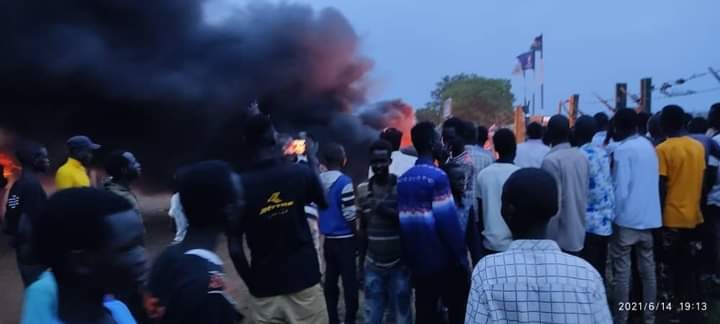The Commissioner of Melut County in Upper Nile state earlier today said that citizens have been demonstrating for the last three days over environmental degradation and lack of promised service provision by oil companies.
Scores of people in the oil-producing Melut County on Tuesday started a peaceful demonstration demanding the government and oil-producing companies provide services and mitigate the environmental impact of oil production.
In September 2020, protesting youth signed an agreement with the government and the PetroDar Operating Company Ltd, which promised to work on and pave all roads linking all the towns in the area, install a piped water distribution system, appoint and pay teachers and build and equip hospitals.
Deng Jo Angok, the Melut County commissioner, acknowledged that the demands of the demonstrators were legitimate due to the lack of basic services and development in the oil-producing area.
"Our point of disagreement with the demonstrators is that there is a small group with a hidden agenda of creating chaos, but we recognize their demands and they must be peaceful,” Commissioner Deng Jo said.
He added, "In the beginning, the youth issued a statement with a 72-hour ultimatum for the government and the company (PetroDar) to respond to their demands and threatened to burn the oil wells. We dealt with the statement because it threatens the security of the company's workers and the region and we asked them to dialogue instead but they insisted on going out to demonstrate.”
According to the commissioner, the authorities on Tuesday arrested seven ringleaders of the protests but they were released on the same day.
Deng Jo told Radio Tamazuj that a committee from the state government in Malakal headed by the governor's advisor for security affairs, Al-Tayeb Ajak, arrived in the county.
"The demonstrators are demanding that the governor not deal with the oil companies, yet security is the responsibility of the governor," Deng Jo said.
The commissioner explained that most residents in Melut town believe in dialogue to settle the matter, but there is a group that wants to use force and that this is against the law.
For his part, Thuon Bany Thuon, a spokesperson for the civil society organizations in Melut, who organized the protests, said the citizens of Melut went out to demonstrate after the government, represented by the petroleum ministry, reneged and failed to implement the development projects promised in the memorandum of understanding they signed last year.
"These protests resulted from repeated demands due to the neglect of the oil companies in the region and the unwillingness of the government and the oil-producing company to provide basic services to citizens in Melut," Bany said. "There is a clear injustice by the government to the citizens in the oil-producing region of Melut. There are no health services, education, electricity, roads, the environment is deteriorating, and death has reached the level of cows and sheep. Infectious diseases are spreading among the citizens and our only demands are the provision of development."
He said they issued a statement before the commencement of the demonstrations and sent it to the petroleum ministry in Juba but the latter did not respond. Instead, the government instituted legal measures against them.
"A committee must come from the capital, Juba, with satisfactory and clear solutions, provided that they will be implemented, otherwise, we will not stop the demonstrations,” Bany vowed.
The memorandum of understanding signed between the people of Melut, the government, and the oil company last year stipulated the direct implementation of development projects by the oil company, under the supervision of the Ministry of Oil and a people’s committee.




